This Is What an Incest Abortion Looks Like
FOR MOST OF my life, people couldn’t recognize my face.
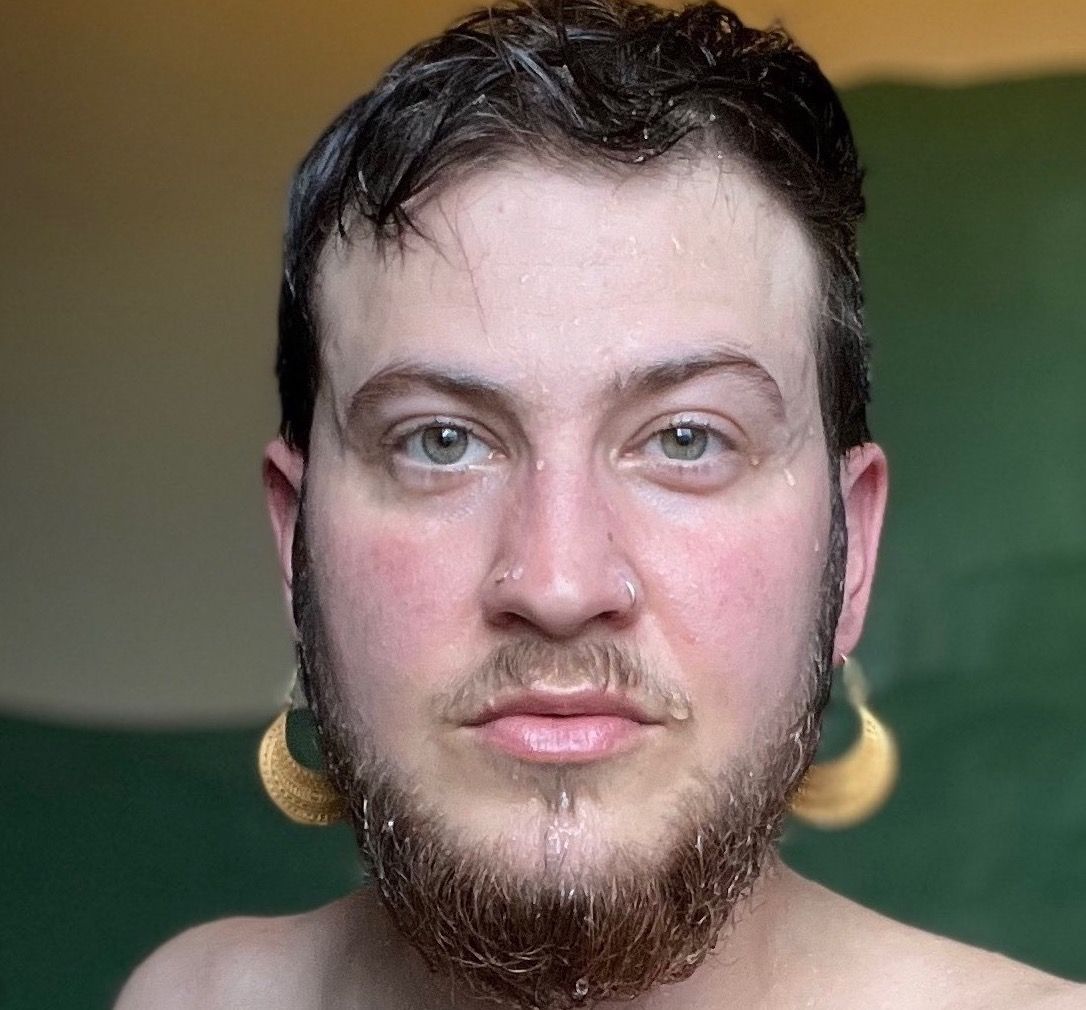
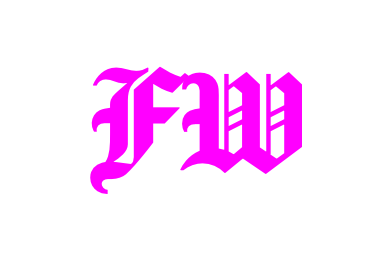
“You look just like Sandra Bullock,” people started saying in my teens—or Claire Danes, or Gina Gershon, they said, strangers, relatives, my own parents. It’s telling that those women don’t look like each other; my not looking like myself, or my looking like anyone—or everyone—was perhaps better reflected by those who peered at me and asked, “Who do you look like?,” searching for a match to my face, something inside them sensing that my face didn’t match itself. “Julia Roberts.” “Geena Davis.” “Hilary Swank.” “Juliette Lewis.”
“Madonna!”
As I got older, people were increasingly likely to find the match in someone close to them. “You look exactly like my best friend,” a new waitress said when she started at the sports bar where I worked after college. “Like, exactly.” She swore that if I could see this friend, I’d see that we were identical, indistinguishable, that I’d be as incredulous as she was, shaking her head in disbelief every time we passed each other her whole first day.
I did eventually meet the friend. The waitress pulled her excitedly toward me one day, saying this was the one, the one she’d been telling us each we looked exactly like, and the friend and I smiled gamely and shook hands, but then peered at one another, confused; we didn’t look any more alike than any random pair of slim white gals. This happens to people of color, of course, that white people can’t tell them apart. But the people who thought I looked like other people were usually white like me.
After I moved to San Francisco in my twenties, it happened often enough that it became a running joke with my roommates. They were often next to me when someone called out “Hey Loretta!”, or whatever, when I was walking down a sidewalk. They heard me say “I’m not who you think I am” so many times that the happening was both a given and an amazement in our shared lives.
“It’s totally weird,” one of my roommates marveled repeatedly, “since you have kind of a weird face. Like, you’re beautiful, obviously, but your features are pretty specific.”
One day we walked into brunch as a group, and a waiter marched directly up and into me, pressing our bodies together, his face in my neck, murmuring, How have you been? His voice was thick with intimacy as he snaked his arm around my waist. My friends watched, surprised, as I got entangled with this dude they’d never seen.
“We don’t know each other,” I said, pulling back from him, knowing exactly what was happening. “It’s just a thing about my face.” I said it casually, like I always did, though people expressed shock every time that I wasn’t who they thought I was.
This waiter furrowed his brow. “Amelia?” (or whatever) he said, looking struck, looking like How could you. No, I told him, I’m not her. He looked at me harder, closer—and still insisted that I was.
“It’s just that thing about my face,” I said as I returned to my roommates, the waiter staring after me. They needed no further explanation. I said it like it was no big deal, but I thought, somewhat indignantly, You can’t tell the difference between me and someone you FUCKED? This had happened one other time, at a bar years earlier—a man had come up to me and started talking about our hookup from the week before, so adamant even after I told him he was mistaken that I had to wonder if I’d somehow blacked out from drinking for the first time in my life. Even after I pulled my best friend over to assure him that she’d been with me the last time we’d been at this bar, and that I’d been with her exclusively, he called us liars, he was so sure.
But I wasn’t her, either.
I wasn’t anyone, it seemed. Almost as often as people thought I was someone else, they didn’t remember meeting me at all, despite even lengthy interactions. Waiting for the BART train one Monday morning, I saw a guy who’d been at a barbecue at my own house the day before, a friend of a friend who’d sat right next to me at a small table for the better part of the afternoon. “Hey!” I said, walking up to him on the platform. He looked at me blankly. I told him my name, and where I lived; he’d been there yesterday, remember? Yeah, he’d been there, he nodded. No, he hadn’t met me. “You sat right next to me,” I said, feeling crazy, and he looked at me like I was. When I insisted we’d talked, he denied it. He continued to even after I repeated a detail he’d told me about one of his houseplants, instead just looking disturbed that I knew.
I USED TO spend a lot of time trying to recognize my face, too.
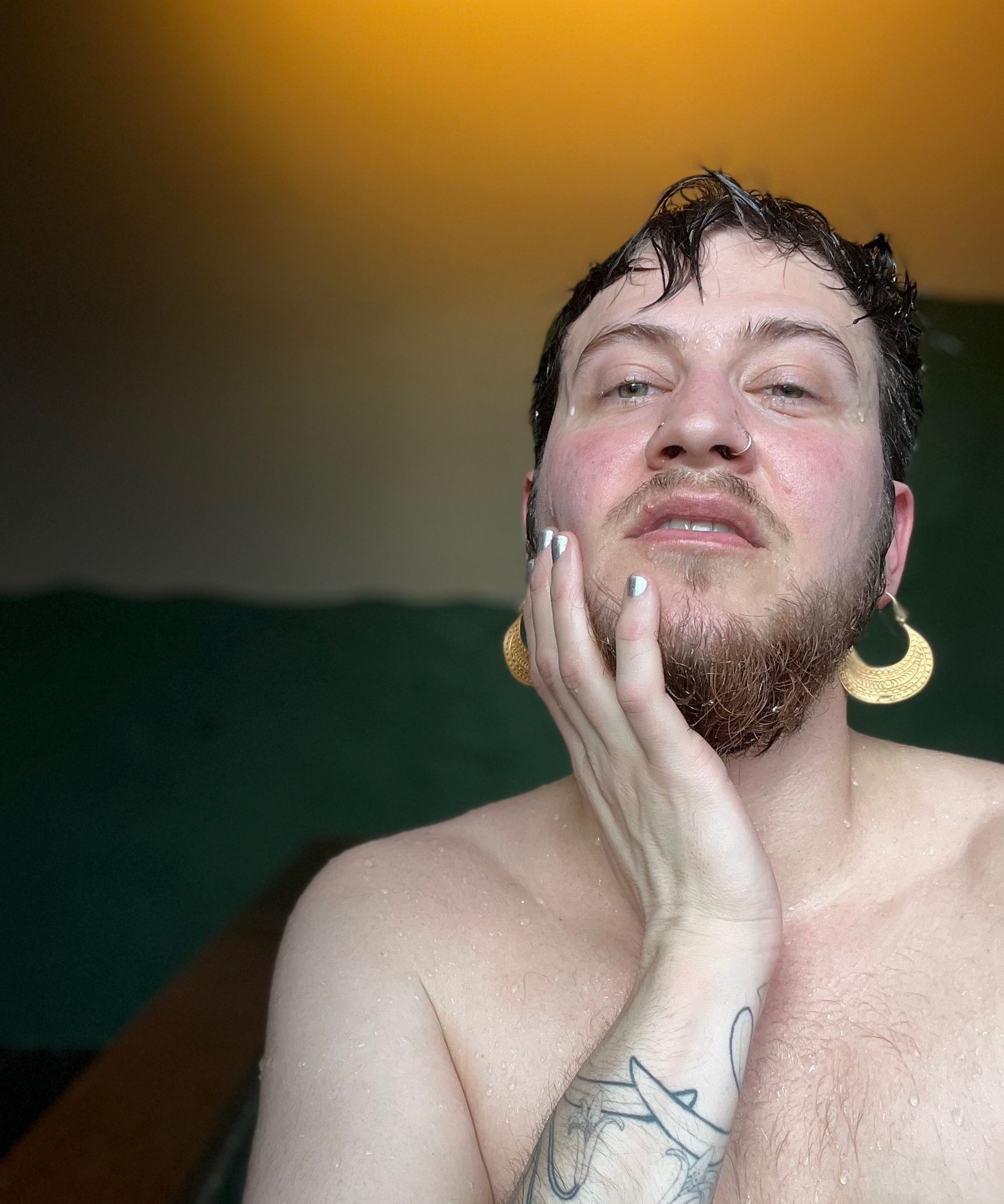
When I was in grade school, I had a hair-curler set that ran on steam. You could, the instructions advised, also use the steaming unit to give yourself a little facial, taking the curlers off and just hovering your face over it. I did this, constantly. I spent hours in my room on my floor, sitting in front of my full-length mirror, running the little steamer and letting it warm my face: late-capitalist, suburban-appliance caress. Intermittently, I’d look up at my reflection, dew and flush on my skin. I turned my face back and forth, up and down. I smiled and pulled my hair away from it, testing all the angles. It looked pretty good, I told myself. It would work.
I could work it.
People didn’t recognize me, but they did want me, from earliest puberty and for as long as I read female after. Eventually I cultivated it: It was coming my way anyway, and I was intrinsically used to it from my dad. “You were always so sexual as a kid,” my older sister said to me once when I was in my thirties. “It wasn’t men’s fault that they wanted you.” I wasn’t so sexual—I’m asexual. I was sexualized. It’s very different. But it works, as far as I can tell, the same. Most cis males seem to like it. Sex-interested men treated me with priority—and always remembered me—and I would take it; sex-related affection was all I knew. When they started courting me as an adolescent, my father was raping me still. He’d started saying, around the time that I got the steam curlers, that now that I was getting older, we would be able to be together soon.
Not something I likely share in common with all the celebrities and friends and exes and countless others I have supposedly always looked just like: that when I was twelve years old, I went into my family’s downstairs half-bath, took the candle and matches that my mom kept on the back of the toilet, and carried them upstairs to my room so I’d have something special when my dad came in that night, because he had impregnated me, so I was going to propose.
I was going to propose that we move, to be together like he said. Raise this baby. He could go to work, I thought, while I stayed home and cared for her. She already had a name, after the actress I’d heard my mom call the most beautiful woman in the world when Death Becomes Her had come out a few months before.
Her name was Isabella.
My dad did come that night. He came most nights (Sometimes every night?, the police officer asked, simply but seriously, when I finally filed a report thirty years later). I did propose, suggesting we move “downtown,” which is what people called Cleveland, thirty minutes but a seeming world away. I climbed on top of him like he liked when he got into my bed, and I lit the candle, nervous, nervous, and I still felt right up into my forties that if I had just done it or said it better, what happened next wouldn’t have happened and the only potential child I ever made wouldn’t be dead.
What did happen was that my plan didn’t work. He got angry. Alarmed. He said my idea was the stupidest he’d ever heard. He told me I was out of my mind. He took me, soon after, to our family doctor’s office, where no one looked me in the eye though I tried to catch several. No one would look me in the eye as I stood there in my Catholic-school skirt, desperate but too scared of him to communicate that I didn’t want an abortion.
It is so strange, to feel so singular yet be treated like I was utterly generic. In my late thirties, after I’d started processing my abuse and transitioning, I went to a business I’d been to some weeks before, and the woman remembered every detail of my order. When I expressed surprise about her level of recall, she said, “Well, you have a very memorable face.” I expressed even more surprise then. For decades, I’d been walking around mistaken or forgotten even when I reminded people who I was, lost or replaced in their minds. Lost in my own. Lost in suppressed grief and misdirected shame. I wasn’t anyone if I wasn’t myself, and I indeed was not that. I was male, actually, and also I proposed to my dad with a filched half-bath candle when I was twelve so he wouldn’t kill my baby, and I didn’t know how to make any of that part of my face.
“You must have had a really nice life,” a lady said to me in the airport a few years ago, after she heard a TSA agent ask me if I was in college and I said I graduated in 2002. That happens almost every day, that someone assumes I’m in my twenties or thirties. When I tell them how old I am, always, they freak out. Sometimes, they tell me about my very fortunate existence.
“You must have been really well cared for,” some guy in an RV park said recently—smugly—when he learned we were about the same age.
“I’m just Hungarian,” I sometimes respond, because an old rich lady (also commenting on my Great Ageless Face Fortune) once told me that Hungarians have amazing skin, though I have no idea if that’s true. I don’t say, “When I was twelve, I begged for the life of my father’s baby inside me by offering to spend a lifetime in incestuous marital servitude, actually.”
Child-pornography warning:
I fucked him first, before I told him I was pregnant. Is that the verb for it? No. What is the word for expertly riding a man you can’t get away from with your little thighs, or your grown-ass ones when you get older and it turns out your lover is mean, so he’ll be nicer, so he won’t hurt you, or hurt a child? And: How is there not a verb for this? This is an experience I do share, with countless nonbinary and trans people, with other men, with billions of women throughout time. Maybe that’s what people were seeing in my face. Maybe that’s the genericness I was reduced to, the actual thing no one wanted to recognize—sheer, universal violence.
FOR MOST OF my life, people were searching for others’ faces in mine. But I unconsciously searched for my face in others’.

After I divorced my second husband, I found a photo one day of myself walking through a forest, and wondered when he’d taken it. Then I looked closer, and realized it was a picture of him: I had taken it. From that distance, small among redwoods, I couldn’t tell us apart. Before him, I’d dated Isaac, whom some of my newer friends said Nico looked like; when my older friends had met Isaac, they’d said, “He looks so much like Dan,” my first husband. Dan looked a little like Nate, my college boyfriend, but not as much as Isaac and Nico did: They all looked, combined, like a lineup of possible cis versions of me. My most recent boyfriend, who I started dating early in my transition, was fifteen years younger than I am, but one day a man stopped us outside the grocery store and asked if we were twins.
People used to ask the same thing of me and my best friend in grade school almost every time we went outside. In my twenties, I had a friend who people assumed was at least my sister. At a deli counter once, she asked for something, and the employee packaged it and handed it to me instead. “That’s mine,” she said, and he looked back and forth between us, startled that we weren’t the same person, that there were two of her where before he’d noticed only one.
I didn’t feel like I was ever going to be able to live my own life. Living close to other people as they lived theirs, I guess, was going to have to be close enough.
The idea that I couldn’t be myself wasn’t self-generated. It was embedded directly into my tissues the time my father raped me when I was four years old and said it was what happens to little boys. It was transmitted by every form of media that pretends transness and incest don’t exist, let alone people who live both, though people like us are many. Who were my models for being who I was? Where’s my representation of a well-adjusted trans person, let alone a trans Stockholm-Syndrome/incest-abortion survivor? “Other people who’ve had incest abortions” is probably the saddest thing I ever googled; sadder still is that the less than 0.5 percent of abortions reported as incest-related in one study of 1,209 patients made me feel a little less alone. That’s fewer than six people. But it’s more than zero.
I wonder about them. I wonder if they wanted their incest abortions, since they were in a position to report them as such. There is a very logical and grief-avoidant part of me that thinks I should have wanted mine, too, and for a time, I tried to tell myself I did, that of course I didn’t want that child, that I’m the poster child for why abortion is so important (as if there needs to be a reason to give people with vaginas rights), that a child raising a child who was also my sister was not a good life. But given the choice, I’d have taken it. I tried to take it. If I’m being brutally honest with myself, part of me doesn’t feel like any other life will ever feel right.
Not long after my abortion, I got braces. I demanded braces, it might be more accurate to say. I’d had the gap between my two front teeth since I had teeth, but suddenly, I couldn’t stand it. We went to an orthodontist, who offered back-of-the-teeth braces that no one could see, a major innovation at the time. It cost way more money. My father said no. In the elevator on the way out, I shut down into a cold mood storm I’d never normally have dared to let escape in front of him, much less at him, but after the abortion, he was tolerating moods he never would have before, and I increasingly couldn’t help it. My teeth, they were one thing I could fix. If I was going to feel terrible all of the time, I might as well look good. If he were going to have ruined me, which he certainly seemed to have done, for life, for anyone else, for god as far as I’d been indoctrinated, the least he could do was help.
I got my way. I don’t remember how much later it was that he came up to me and told me he’d decided to let me have the fancy braces, but he delivered the news solemnly, lest his sacrifice and magnanimity go unappreciated. He would continue to remind me of both, specifically re this expensive orthodontia, for as long as we still knew each other. Twenty years after that painful hardware was taken off, a replacement retainer I’d gotten as an adult slightly messed up the alignment, and I went to yet another orthodontist to buy myself Invisalign. By then, I knew I was about to transition; if I was going to be an outcast, at least I was going to have perfect teeth.
I followed it with perfect hair, engaging increasingly expensive barbers with a widening array of services, ultimately getting every head follicle trimmed and polished down to my eyebrows. Last year, I directed and fronted a documentary, and scrubbing through some of the footage, I saw exactly what I’d been trying to create: a handsome, unimpeachably groomed (if unconventionally dress-wearing) white guy.
I looked, to myself on the screen, un-alive. Which was exactly how I felt.
It wasn’t long after that I stopped wearing my retainers, letting my teeth start to space back out. Eventually I cut my own hair and dyed it. At various points, I shaved the center out of my beard (“I didn’t know mutton chops were back in style,” someone started a Zoom meeting by commenting, to which I responded: “They’re not.”). I’d already just quit my supposedly respectable career, and soon, I left my respectable apartment and zip code and moved into an RV. Right before that, I got more holes punched into my face, though even the piercers were judgmental about where. “It’s asymmetrical, but it’s your face,” one of them said (who knew there were so many rules in face-hole-punching!) when I pointed to a precise placement, and even as he drove the needle through, I could feel with great, deep-breathed relief that it was where it belonged, in the place only I could see was right.
There’s this phenomenon I’ve experienced, just a couple of times and just since I transitioned, where my eyes meet someone else’s and there’s an explosive shine, a light that all of a sudden ignites their irises. I could feel both times that it was partly a reflection of my own eyes—that whatever was happening was happening between both of us, was dynamic, was bouncing off my irises, too. Both times it happened, the other person was trans. One of those guys could have been an incest survivor—half of trans people are sexually assaulted in their lives, most of them as children, so there’s an even chance. The other, I know was. The one whose story I know, I know it isn’t like mine, and the other guy I know nothing about except that he was frankly kind of an asshole. But there was some kind of recognition we reflected to each other, and though I don’t even know what it was, I felt hungry for it as soon as I saw it, like I’d been looking for it my whole life.
A few months ago, some five years into my transition and almost thirty years after the day—January 26, 1993—that my father told a doctor to terminate a pregnancy in my body and the doctor obliged without asking me one single question, I started seeing it again. The first time, I was living in some nice stranger’s driveway, parked there in my RV after my life became cheaper and muddier but true. I saw it again in a snowy RV park, coming out of the shower in the communal bathrooms. Both times, my eyes caught a mirror, and it was my own face that lit my irises, beaming back my own recognition, reflecting that shine.

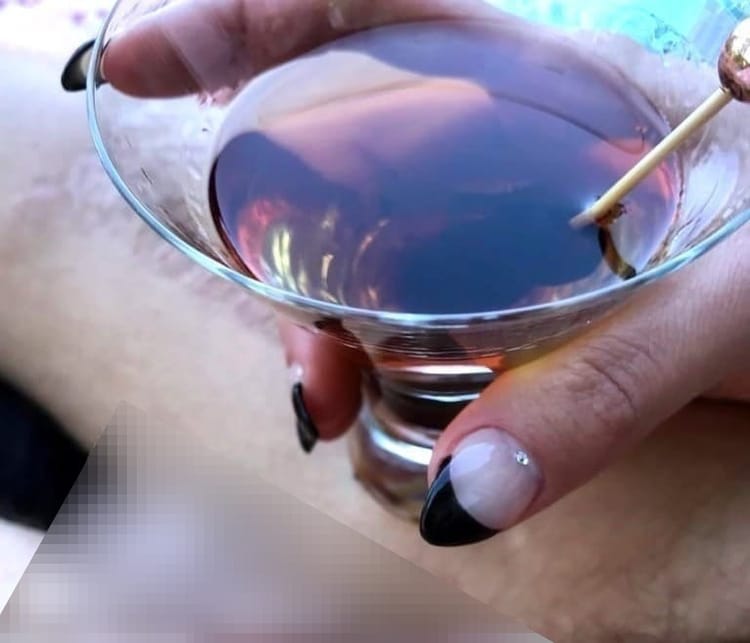
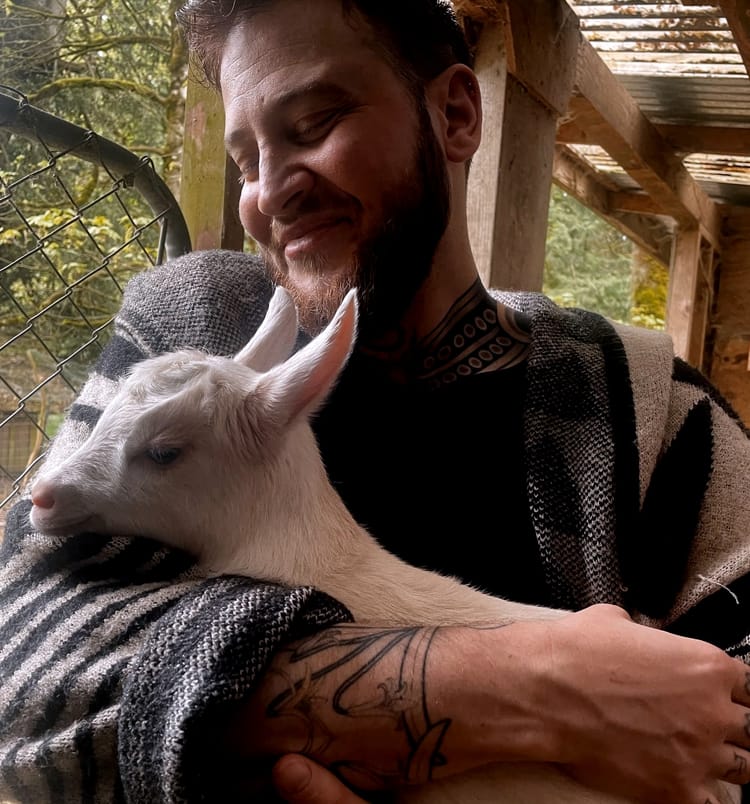
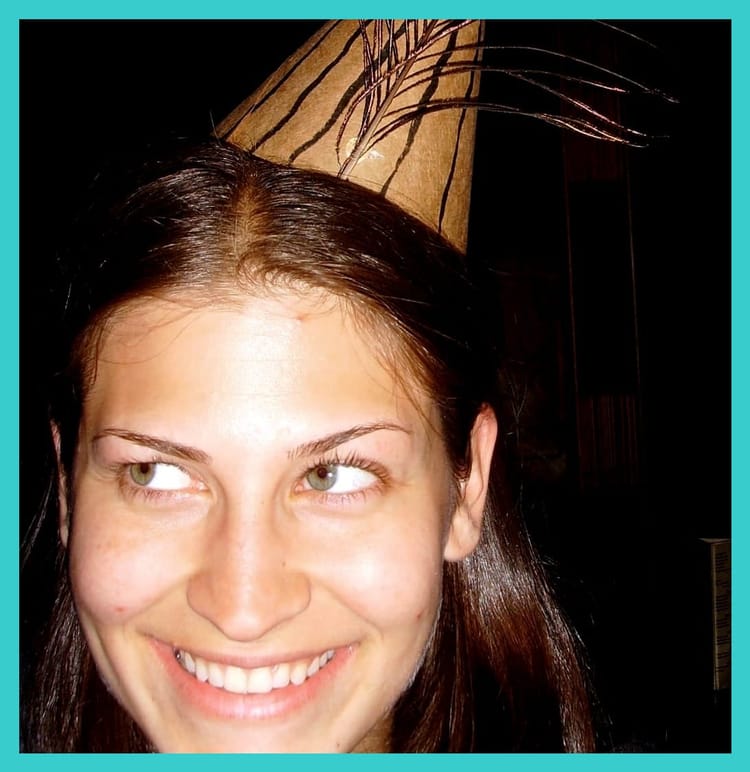
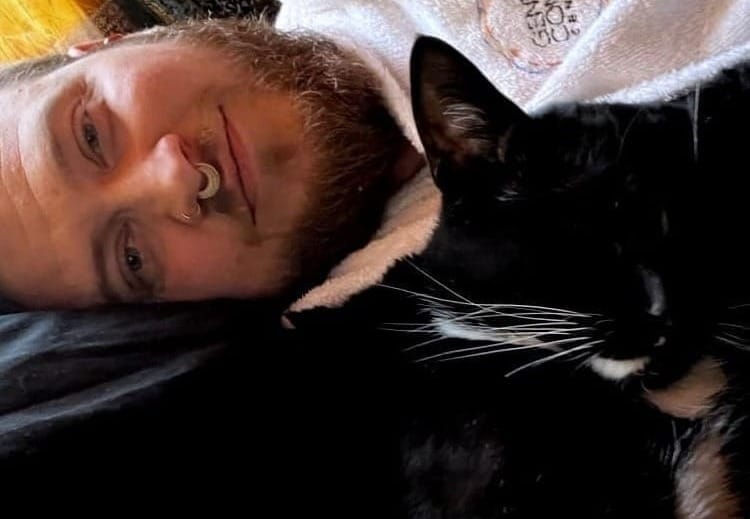

Member discussion